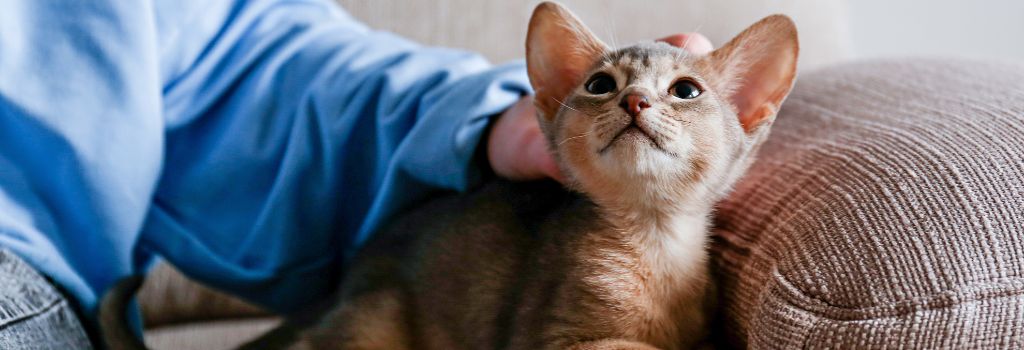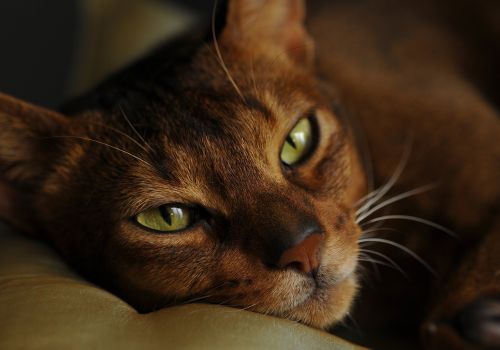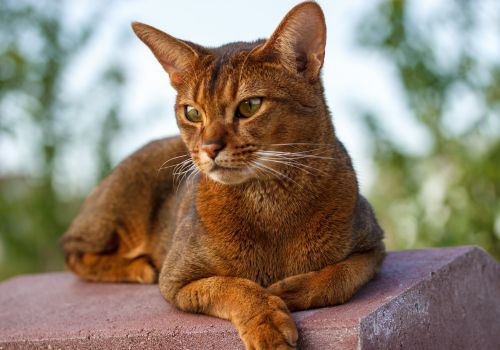Welcome to the world of Abyssinians, or as aficionados affectionately call them, "Abys." Trust us, having an Aby around is like having a little ball of sunshine that radiates energy throughout your home.
Some Pieces of Purr-fection
Known for their endless curiosity and busy-bee demeanor, Abyssinians are the epitome of feline vivacity. From their quiet chirps to their daredevil leaping abilities, they're entertainers through and through, making your life brighter and much more amusing with every flick of their agile tails.
Bubbling with Personality: The Ups and Downs
They want to be the epicenter of your universe and can get pretty antsy if you're not engaging them in some fun and frolic. These cats do not enjoy solitude and can feel pretty blue if left alone for extended periods. Moreover, their fearless approach to life might sometimes lead them into tricky situations if they're not adequately supervised. So, if you're one for intimate dinner parties, remember that your Aby will probably want to be the guest of honor!
Urban Jungle Vs. Sprawling Estates
Thinking of keeping an Abyssinian in a cramped city apartment? Think again. These cats thrive in spaces where they can stretch their legs and engage in high-speed chases with imaginary prey. Limited spaces might not suit their expansive personalities. Additionally, while Abys are generally known for their bold and confident nature, improper breeding can result in cats that are a little on the nervous or shy side.
A Legacy that Stretches Back to the Pyramids?
The Abyssinian lineage is thought to hark back to Southeast Asia and the Indian Coast, making them one of the feline world's ancient nobles. They carry themselves with an air that could make you believe they've stepped right out of an Egyptian mural, what with their ticked coats and large, alert ears. These cats are socialites, thriving in environments where they can interact with other felines and, of course, their favorite humans. Though they may not be the type to curl up on your lap for hours, they have their own unique ways of showing affection, be it through a game of fetch or a splashy romp in the water.
Is the whirlwind of owning an Abyssinian worth it?
A resounding yes! They're not just pets; they're life enhancers. You don't own an Abyssinian; you experience one. Keep her engaged, and you'll find that she's not just a cat but a playful, affectionate companion who adds a splash of color to your life every single day.

Genetic Predispositions for Abyssinians
When Hearts Skip a Beat: Feline Cardiomyopathy
This heart muscle disease is more common among our feline friends than you might think. It can either be a primary condition they inherit or a secondary one developed due to other ailments. For example, hypertrophic cardiomyopathy (HCM) often develops from an overactive thyroid gland, causing the heart muscle to thicken. Dilated cardiomyopathy (DCM) could arise from a dietary taurine deficiency, although thankfully, modern cat foods usually include taurine, making DCM rarer these days. Catching these signs early is crucial, but tricky since our fur babies are masters of disguise when it comes to illness. Rapid breathing, lethargy, and poor appetite are often the first signs we notice, and by then, the condition might have escalated. A wellness check-up twice a year can help catch this early, so don't skip those vet visits!
FATE: The Silent Stalker in the Bloodstream
Now, let's chat about FATE, which stands for feline aortic thromboembolism. Cats with heart disease are at risk of developing this life-threatening condition, where blood clots block the aorta, the primary artery from the heart. This could lead to paralysis or severe pain in the hind legs. If you notice any sudden inability in your cat to walk or a dragging motion in their back legs, act immediately. Time is of the essence, and emergency medical care is crucial.
The Mystery of FIP Susceptibility in Abyssinians
Feline Infectious Peritonitis (FIP) is a fatal disease caused by a sneaky coronavirus. While all cats carry this virus, it can mutate and become dangerous, especially in susceptible breeds like Abyssinians. The disease damages blood vessels and causes fluid buildup, often leading to heartbreaking outcomes. Unfortunately, testing is not reliable, and there is no known cure, making FIP a significant risk, particularly when buying from a breeder. Always ask about any history of FIP before making a purchase.

The Unseen Enemy: Cryptococcosis
Cryptococcosis is another infection you'll want to know about, especially if you have an Abyssinian or a Siamese. This disease is caused by a yeast-like fungus and can affect various organs, including the brain. Early signs include lethargy, weight loss, and nasal discharge. While the infection can become quite severe, most cats respond well to antifungal medications, so catching it early can make a world of difference.
Be Blood-Type Aware: It Can Save Lives!
Do you know your cat's blood type? Just like in humans, knowing your cat's blood type can be a lifesaver in emergencies requiring a blood transfusion. Abyssinians often have type B blood, unlike most domestic cats, which generally have type A. Testing your cat's blood type can be a part of regular wellness exams and is especially crucial for purebred cats.
The Dangers of Neonatal Isoerythrolysis
Planning on breeding your Abyssinian? Be aware of Neonatal Isoerythrolysis (NI). This rare condition happens when a newborn kitten with a different blood type than its mother ingests colostrum, triggering a fatal immune response. This disease is a significant concern in breeds like Abyssinians, where there's a higher likelihood of type B blood.
The Little-Known Abyssinian Disorder: Increased Osmotic Fragility of Erythrocytes
There's a unique kind of anemia called increased osmotic fragility of erythrocytes, which has been documented in young Abyssinians. This condition results in fragile red blood cells, leading to a shortage in the bloodstream and the potential for significant health concerns. Though there's currently no cure, blood transfusions can relieve severe symptoms.
Pyruvate Kinase Deficiency: The Unseen Anemia
Pyruvate Kinase Deficiency, or PKD for short. It's a rare inherited condition that involves a critical enzyme called pyruvate kinase, found in your feline friend's red blood cells. Now, why is this enzyme so important? It helps cells generate the energy they need to stay alive. When this enzyme is in short supply, the red blood cells don't last as long, and that could lead to anemia in your cat. Now, the silver lining is that this usually develops slowly and is generally mild, allowing your cat to adapt without showing overt symptoms. But beware, in some rare cases, PKD could trigger a severe, life-threatening form of anemia. A simple genetic test can tell you whether your cat is affected, a carrier, or in the clear, especially if you have breeds like Abyssinians that are more susceptible.
FLUTD: When Your Cat Cries for Help
We've all been there: you find a puddle of urine somewhere it absolutely shouldn't be, and you think, "Oh no, not again!" Before you get upset with your feline friend, consider that they might be telling you they're in discomfort. Welcome to the world of Feline Lower Urinary Tract Diseases, or FLUTD. Multiple disorders can fall under this umbrella term, each affecting your cat's urination habits. So how do you know if your cat has FLUTD? Keep an eye out for unusual signs like urinating on cool surfaces, blood in the urine, or your cat struggling in the litter box. Time is of the essence, especially for male cats, as a blocked urethra could quickly turn fatal. Regular vet check-ups can catch early signs, and the condition is usually manageable through medication or even surgery in extreme cases.
Amyloidosis: The Silent Organ Clogger
If you've ever heard of Alzheimer's in humans, you might be familiar with the term 'amyloid.' These are proteins that, in cats, tend to accumulate in abdominal organs like the kidneys, liver, and pancreas. The problem? They can cause the organs to fail. To confirm amyloidosis, a tissue biopsy is usually necessary. Unfortunately, there's no known cure for the disease itself, but you can manage the symptoms through medication and diet to support affected organs.
Renal Failure: The Quiet Kidney Crisis
Kidney disease is sadly all too common in cats, especially as they get older. But did you know that even kittens can suffer from renal failure due to genetic issues or exposure to toxins? These tiny organs have the massive job of filtering waste from the blood, and when they can't do that effectively, it's a problem. Thankfully, medications and special diets can significantly help in managing the disease.

Patellar Luxation: The Wobbly Kneecap Conundrum
Our agile cats leap, jump, and pounce thanks to their amazing knee joints, or 'stifles.' But imagine if the kneecap, or 'patella,' started to slip out of place? That's exactly what happens in patellar luxation. Often, cats with this condition won't show symptoms until it's quite advanced. Early detection through x-rays is crucial for effective treatment, which may include surgery for severe cases.
Hip Dysplasia: Not Just a Dog's Problem
If you thought hip dysplasia only plagued dogs, think again! This hereditary condition can affect cats too, causing malformation of the hip joints. Early x-rays can catch the condition, leading to better management and potentially surgery for a better quality of life.
Gingivitis: Red Flags in Kitty's Mouth
If you've noticed your cat's gums looking a bit red and inflamed, it might be time to discuss gingivitis with your vet. Without treatment, it can escalate into severe dental issues. Routine oral check-ups are your best line of defense against gingivitis and other oral diseases.
Resorptive Oral Lesions: The Silent Toothache
This condition is a real pain—in your cat's teeth, that is. It starts as tiny erosions in the enamel but can escalate into something much worse. With about 70% of purebred and 40% of mixed breed cats affected, regular vet visits are essential for early detection and treatment of tooth resorption.
Psychogenic Alopecia: The Stress-Induced Bald Spots
Imagine licking yourself bald because you're so stressed out! That's psychogenic alopecia for you. If you notice your cat's fur looking patchy, it might be more than just an itch they're trying to scratch.
Shaft Disorder of Abyssinian Cats: The Frizzy Whiskers Mystery
For Abyssinian cat parents, watch out for dull fur and brittle whiskers; it could be a shaft disorder. While not life-threatening, maintaining your cat's coat quality is crucial for their well-being.
Feline Hyperesthesia Syndrome: The Sensitivity Dilemma
Does your cat seem overly sensitive to touch, to the point where even a gentle stroke makes their skin ripple? It could be Feline Hyperesthesia Syndrome. Proper diagnosis and medication can help manage this condition.
Nasopharyngeal Polyps: The Silent Vision Thief
For some cats, especially Abyssinians, progressive retinal atrophy or PRA is an inherited disease that eventually leads to blindness. Although heartbreaking, knowing the status through genetic testing before breeding can help prevent its spread.
Don't have a vet in your area yet? We can help you find a local veterinarian.
If you have more questions, the GeniusVets Telehealth platform will give you unlimited access to text and/or video calls with board-certified veterinarians! To learn more click here.


